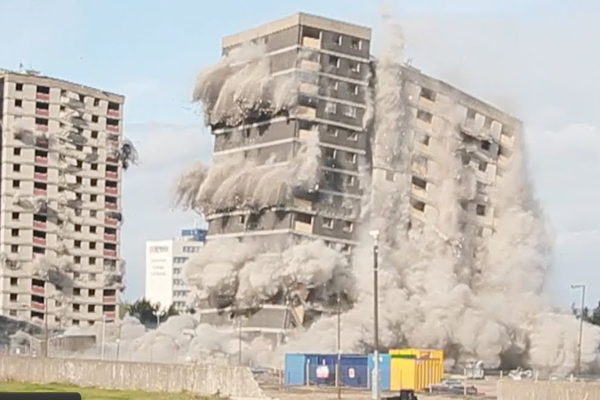A building is designed considering a span of life. When this design life of the building is over, the structure is not safe for living for one’s self as well as for neighbouring buildings. So demolition becomes pivotal. It is a method used for safe and careful removal of existing buildings and structures in order to utilise the land for some other purpose. There can be many reasons for the demolition of a building such as loss of structural stability, structural damage, illegal construction or plans to restructure. If you have a massive building surrounded by other buildings you need to find means to properly demolish the building, therefore demolition method selection is pivotal.
In 2020, two of the four apartment complexes in Maradu in Kerala’s Kochi were demolished in a controlled implosion after the Supreme Court’s order for violating the Coastal Zone Regulation (CZR) norms. Described as the first such implosion demolition in the country of this dimension, two luxury waterfront high-rises in the Maradu district of Kochi city were razed to dust. The first block of flats was demolished and a minute later the second block followed it to the ground.It is one of the largest demolition projects undertaken in India involving residential buildings. Mumbai-based Edifices Engineering carried out the explosion with the assistance of experts from South Africa-based Jet Demolition.
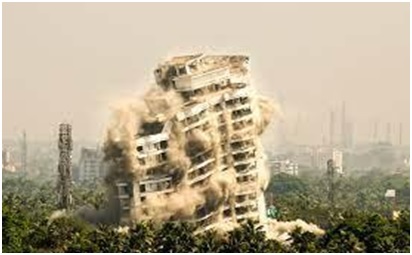
The above cited example is just one of the many demolition projects undertaken across India and the globe. The reasons could be a structural failure, age of the building, illegal construction and need for restructuring. Given below are 5 examples of demolition of structures undertaken due to these reasons.
In focus – 5 demolition projects across India and the globe
India – Aravalli, Gurugram, 2020 – Seventeen farm houses constructed illegally in the Aravalli region in Gurgaon were demolished by a joint team of the Municipal Corporation of Gurugram (MCG) and Department of Town and Country Planning (DTCP). The reasons cited were illegal occupancy and a complete lack of any concern for the environmental and ecological degradation. These farmhouses had been constructed illegally on around 50 acres of land, without applying for any permission. The demolition was carried out near Bandhwari village.
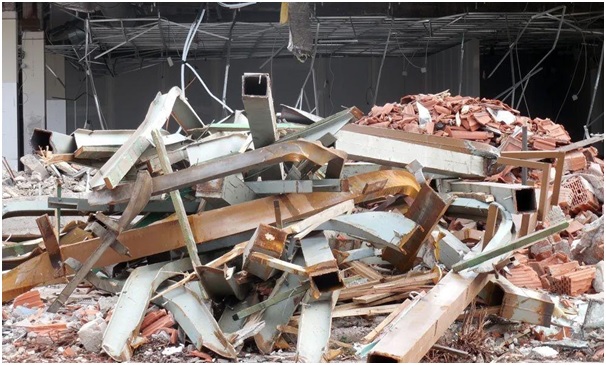
UAE – Abu Dhabi, 2020 – Abu Dhabi’s iconic Mina Plaza, which consisted of four towers with 165-meter height was demolished in just 10 seconds last year. The 144 floors of the plaza were successfully demolished in a record 10 seconds on November 27. It has set a new Guinness World Record of ‘tallest building demolished using controlled demolition. The demolition involved the use of 6000 kg plastic explosives and a detonator cord. The abandoned unfinished tower blocks, located in the Mina Zayed area, were demolished to pave the way for an all-new wharf in the iconic port-side community. Modon Properties was appointed by the DMT to carry out the demolition of Meena Plaza Towers.
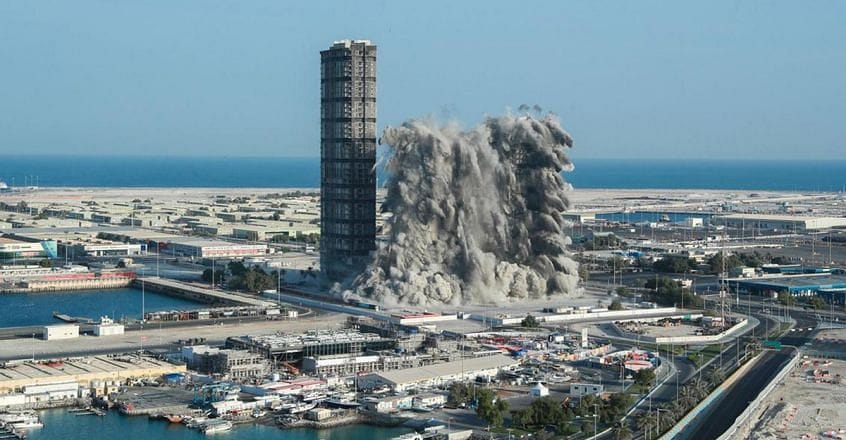
Italy – Genoa, 2019 – Demolition experts blew up what remained of the Morandi bridge in the Italian city of Genoa nearly a year after the structure collapsed. Thousands of people were evacuated ahead of explosions to bring down two large towers consisting of about 4,500 tonnes of concrete and steel. To prevent the spread of dust, the bridge was lined with 50 large water tanks to minimise potential air pollutants. The demolition was done as forty-three people were killed when part of the bridge, and cars traveling along with it, fell 45m (148ft). The reason for the collapse was not officially determined but the purported hypothesis includes wet conditions, landslides, structural weakness and corrosion.

United States, Texas 2019 – Ocean Tower was built in South Padre Island, Texas. The highrise was still under construction when it was revealed that it was shifting and leaning to one side. This structural failure led to the decision to demolish the condominium building. The implosion was done by stripping the tonnes of material of the building. The plan implemented was to attack the three massive cores of the building with implosion. Built to stand up to a hurricane, these solid monoliths were so dense that they were immune to the wrecking machines. The designers found a way to reduce the giant tower’s height by more than 30 metres so it could fit into the drop zone. The project was executed by the Control Demolition Incorporated company.
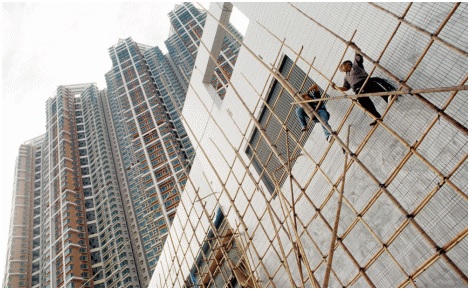
India-Moulivakkam, Chennai 2016: An 11-storey building in Moulivakkam was demolished in 2016. The second block of the building was declared unsafe after an adjacent block collapsed. The building demolition was done by using implosion technique. Columns in the 11-storeyed structure were filled with explosive substances and brought down employing controlled blasting of explosives. Timer devices were used and the multiple blasts were carried out sequentially by using a remote.
The reason cited for demolition was that the building was grossly under-designed for a 11-storey building. The demolition was undertaken by Tirupur-based Maglink Infra Project Limited.
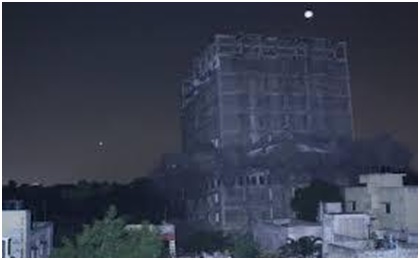
In all of the above cases, the demolition methods were selected based on structure detail, soil property investigation and surrounding inhabitant present. For carrying out demolition you need to keep account of surveying, removal of hazardous materials, preparation of plan and safety measures. A successful demolition occurs if all these are appropriately addressed. Discussed underneath are different types of demolition methods that can be adopted.
Different types of demolition methods
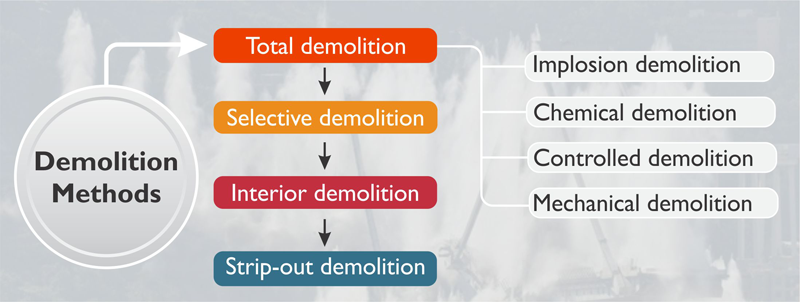
Total demolition
As the name suggests this involves the demolition of an entire structure. This is mostly applied to the re-structure of a building. There are different methods to carry this type of demolition each of them is given below.
Implosion demolition – It is a form of demolition in which objects are destroyed by collapsing on themselves. This method employs the use of explosives to bring down high structures by undermining structural supports so that it collapses within their footprint or along a predetermined path. Depending on how the structure falls, there are two types of implosion: a) Falling like a tree and Falling into its footprint. In this method instead of an explosion outwards, the force of the explosion is directed at critical support points, which are suddenly weakened making the weight of the building unstable. It collapses in a controlled manner.
Chemical demolition – This method involves the use of concrete demolition powder, concrete breaking chemical, and concrete cracking chemical you can quickly and safely bring down large structures. This advanced concrete cracking agent has expansive power that demolishes even massive buildings with minimum effort and time. The concrete breaking powder is non-explosive and soundless. Chemical demolition without the use of explosives works safely and can be more cost-effective. There is no lengthy permitting process required, as opposed to blasting. The remainder of the structure is safe from vibration, and certain areas of valuable stone can be preserved.
Controlled demolition – It is a demolition method that involves taking down buildings and structures in a safe, guided manner in order to achieve the best timely results. Most structures can’t be taken down in a day, so when things are in the process of being demolished, a building must be taken down in sections to ensure that the remains are as stable as possible. Controlled demolition can be used for tall buildings, bridges, chimney stacks and cooling towers This type of demolition is done by diamond drilling and hydraulic concrete crunching.
Mechanical demolition – this method involves the use of specialized mechanical equipment and tools. These equipment include hydraulic excavators equipped with specialized attachments that can break concrete and steel to demolish the structure apart. The building with a greater height up to (6-7 story) cannot be demolished with the help of excavators or bulldozers. In such cases, cranes with wrecking balls are used to perform the demolition activity. The wrecking ball crack is attached with a huge steel ball hanging from a steel rope. The steel ball is pulled and released towards the building. High-reach arm machines can be used for projects of 20 meters. The arm is telescopic and has demolition tools attached at the end; shear, hammer or crushers. This type of demolition is more precise than the crane and ball because specific demolition tools can be used on different building materials like steel or concrete.
Selective demolition
This type of demolition includes removing specific parts of a building. Some old buildings stand the test of time and others don’t. This method involves the removal of specific interior portions while protecting the remaining structure and exterior portions of a building protecting nearby structures and areas. For interior demolition, sledge hammers are used and for exterior demolition excavators, bulldozers or skid steers loaders are used.
Interior demolition
This type of demolition involves the removal of specific interior buildings The method will vary based on whether you want to remove one or multiple sections from the buildings. This usually includes removal of walls, ceilings, pipes, etc.
Strip-out demolition
This method involves the careful dismantlement or deconstruction of a building or structure to preserve parts for reuse, refurbishment or recycling. In this type, careful dismantlement or deconstruction of a structure is done to preserve components for reuse.
Conclusion
The selection of the right demolition method is important and it needs to be done safely and correctly so the surrounding neighbouring building or structure does not get affected. Select a demolition expert who has the skill and experience of undertaking
structure detail, soil property investigation, and safety of the surrounding buildings and public areas before execution of the project. These are a few methods, other than these innovations that are happening across the world with varied other kinds of demolition methods, which will be discussed in an upcoming article.

